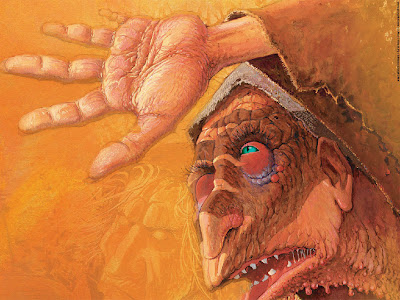La force des choses
24.6.05
Imago Dei
It is only through the psyche that we can establish that God acts upon us, but we are unable to distinguish whether God and the unconscious are two different entities.
Both are border line concepts for transcendental contents.
But empirically it can be established, with a sufficient degree of probability, that there is in the unconscious an archetype of wholeness which manifests itself spontaneously in dreams, and a tendency, independent of the conscious will, to relate other archetypes to this centre.
Consequently, it does not seem improbable that the archetype produces a symbolism which has always characterised and expressed the Deity.
The God-image does not coincide with the unconscious as such, but with a special content of it, namely the archetype of the Self.
It is this archetype from which we can no longer distinguish the God-image empirically.
One can, then, explain the God-image… as a reflection of the Self, or, conversely, explain the Self as an Imago Dei in man.
Carl Gustav Jung, Psychology and Religion: West and East (Coll. Works, vol II, page 468)
O termo surge entre os primeiros filósofos da Igreja, segundo os quais a “imago Dei” está impressa na alma humana.
Quando essa imagem é produzida espontaneamente em sonhos ou visões, do ponto de vista psicológico corresponde a uma imagem reflexa do Self de Jung, isto é do Absoluto psíquico.
Etiquetas: jung, psicologia, religião
22.6.05
Reflections over consciousness

IlkaHartmann
When one reflects upon what consciousness really is, one is profoundly impressed by the extreme wonder of the fact that an event which takes place outside in the Cosmos, simultaneously produces an internal image, that it takes place, so to speak, inside as well, which is to say: becomes conscious.
For indeed our consciousness does not create itself – it wells up from unknown depths.
In childhood it awakens gradually, and all trough life it wakes each morning out of the depths of sleep, from an unconscious condition.
It is like a child that is born daily out of the primordial womb of the unconscious.
C.G. Jung, Psychology and Religion: West and East (Coll. Works, Vol. II, page 569)
Etiquetas: jung, psicologia

